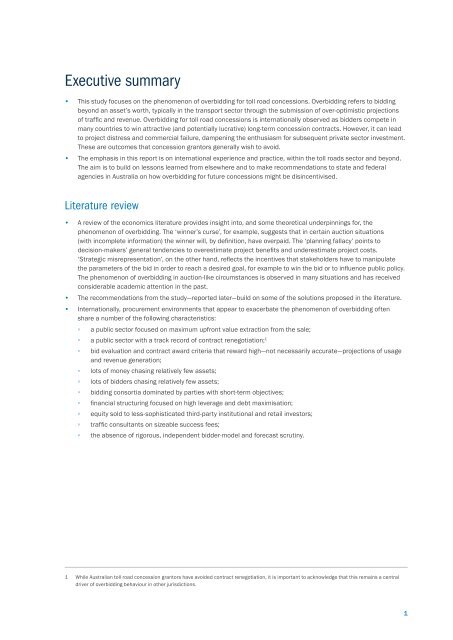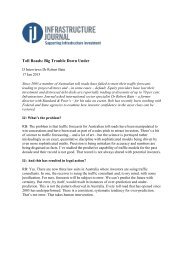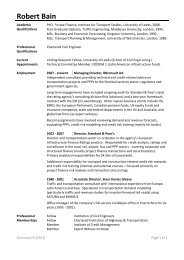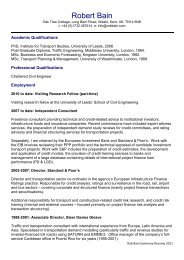Disincentivising overbidding for toll road concessions
Disincentivising overbidding for toll road concessions
Disincentivising overbidding for toll road concessions
- No tags were found...
Create successful ePaper yourself
Turn your PDF publications into a flip-book with our unique Google optimized e-Paper software.
Executive summary<br />
••<br />
This study focuses on the phenomenon of <strong>overbidding</strong> <strong>for</strong> <strong>toll</strong> <strong>road</strong> <strong>concessions</strong>. Overbidding refers to bidding<br />
beyond an asset’s worth, typically in the transport sector through the submission of over-optimistic projections<br />
of traffic and revenue. Overbidding <strong>for</strong> <strong>toll</strong> <strong>road</strong> <strong>concessions</strong> is internationally observed as bidders compete in<br />
many countries to win attractive (and potentially lucrative) long-term concession contracts. However, it can lead<br />
to project distress and commercial failure, dampening the enthusiasm <strong>for</strong> subsequent private sector investment.<br />
These are outcomes that concession grantors generally wish to avoid.<br />
••<br />
The emphasis in this report is on international experience and practice, within the <strong>toll</strong> <strong>road</strong>s sector and beyond.<br />
The aim is to build on lessons learned from elsewhere and to make recommendations to state and federal<br />
agencies in Australia on how <strong>overbidding</strong> <strong>for</strong> future <strong>concessions</strong> might be disincentivised.<br />
Literature review<br />
••<br />
A review of the economics literature provides insight into, and some theoretical underpinnings <strong>for</strong>, the<br />
phenomenon of <strong>overbidding</strong>. The ‘winner’s curse’, <strong>for</strong> example, suggests that in certain auction situations<br />
(with incomplete in<strong>for</strong>mation) the winner will, by definition, have overpaid. The ‘planning fallacy’ points to<br />
decision-makers’ general tendencies to overestimate project benefits and underestimate project costs.<br />
‘Strategic misrepresentation’, on the other hand, reflects the incentives that stakeholders have to manipulate<br />
the parameters of the bid in order to reach a desired goal, <strong>for</strong> example to win the bid or to influence public policy.<br />
The phenomenon of <strong>overbidding</strong> in auction-like circumstances is observed in many situations and has received<br />
considerable academic attention in the past.<br />
••<br />
The recommendations from the study—reported later—build on some of the solutions proposed in the literature.<br />
••<br />
Internationally, procurement environments that appear to exacerbate the phenomenon of <strong>overbidding</strong> often<br />
share a number of the following characteristics:<br />
◦◦<br />
a public sector focused on maximum upfront value extraction from the sale;<br />
◦◦<br />
a public sector with a track record of contract renegotiation; 1<br />
◦◦<br />
bid evaluation and contract award criteria that reward high—not necessarily accurate—projections of usage<br />
and revenue generation;<br />
◦◦<br />
lots of money chasing relatively few assets;<br />
◦◦<br />
lots of bidders chasing relatively few assets;<br />
◦◦<br />
bidding consortia dominated by parties with short-term objectives;<br />
◦◦<br />
financial structuring focused on high leverage and debt maximisation;<br />
◦◦<br />
equity sold to less-sophisticated third-party institutional and retail investors;<br />
◦◦<br />
traffic consultants on sizeable success fees;<br />
◦◦<br />
the absence of rigorous, independent bidder-model and <strong>for</strong>ecast scrutiny.<br />
1 While Australian <strong>toll</strong> <strong>road</strong> concession grantors have avoided contract renegotiation, it is important to acknowledge that this remains a central<br />
driver of <strong>overbidding</strong> behaviour in other jurisdictions.<br />
1






